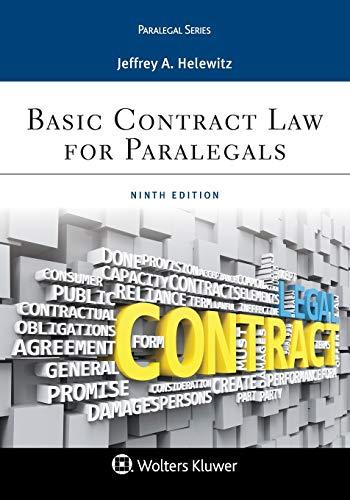This is an action instituted by the plaintiff, American Express Travel Related Services, Inc., against the defendant,
Question:
This is an action instituted by the plaintiff, American Express Travel Related Services, Inc., against the defendant, Jay Weppler, claiming money damages for the failure to pay amounts due from the purchase of commodities and services made under a credit agreement. The matter was tried to the court on September 11, 2002 and post-trial briefs were filed by the parties. The plaintiff’s brief was filed on September 25, 2002 and the defendant’s brief was filed on October 7, 2002. After consideration of the evidence and the issues as presented, the court enters a verdict in favor of the defendant.
The dispositive facts of this matter are undisputed. As part of a solicitation by the plaintiff, the defendant signed an application requesting the plaintiff to issue two credit cards, to himself and another employee of UNICO, Inc. The defendant was the president and employee of the company UNICO, Inc. The court finds on the basis of the defendant’s testimony that the amounts sought by the plaintiff were for charges incurred by the defendant for the benefit of UNICO. Neither the plaintiff nor UNICO paid for the charges at issue which total $42,315.39.
The terms and conditions for the use of this card were contained in an
‘‘Agreement Between Corporate Cardmember and American Express Travel Related Services Company, Inc.’’ The plaintiff relies on the following provisions in this agreement to support its claim against the defendant:
You, as the Corporate Cardmember, are solely and personally liable to us for all Charges made in connection with Corporate Card issued to you. The company is not responsible to us for payment of such Charges. You should notify us immediately of any change in your billing address. Valid business expenses charged to the Corporate Card will be reimbursable by the company under the Company’s expense reimbursement procedures applicable to you. This agreement has no effect on such procedures or your right to reimbursement by the Company.
No other person is permitted to use this Corporate Card for charges, for identification, or any other reasons. We will look to you for payment of all Charges made with the Corporate Card issued to you, even if you have let someone else use the Corporate Card or relinquished physical possession of the Corporate Card.
The defendant, on the other hand, relies on a later provision of the agreement to support his defense that he is not personally liable for the charges. This provision is contained in what appears to be an addendum or a rider to the primary agreement:
The Corporate Cardmember will be solely liable for all Charges on the Corporate Card Account except that the Company will be responsible to Amexco for Charges which benefitted the Company directly or indirectly and for which the Company has not reimbursed the Cardmember; and for any charges centrally billed to the Company.
In summary, one provision of the agreement indicates that
‘‘Cardmember’’ is solely responsible for all charges on the account and the company is not responsible for any of the payments, whereas another provision indicates that the company will be responsible for payments for those unreimbursed charges that are incurred for the benefit of the company.
The courts agree with the defendant’s position regarding the interpretation of this agreement. The plaintiff’s view that the defendant is primarily and solely liable for the charges is rejected because it would construe the agreement in a manner which would make the later provision superfluous and meaningless.
The court finds that the latter language relied on by the defendant qualifies the earlier provisions of the Agreement so that the defendant was made responsible for charges on the card for his personal benefit; and the company, UNICO, was made responsible for charges on the card for UNICO’s benefit for which UNICO failed to reimburse the defendant. This construction of the contract is the most reasonable interpretation of these provisions which appear facially inconsistent. The agreement consists of form documents created by the plaintiff, and the law is established that an ambiguity such as the one presented here must be construed against the drafter. Hartford Electric Applicators of Thermalux, Inc. v. Alden, 169 Conn.
177, 182, 363 A.2d 135 (1975) (‘‘When there is ambiguity, we must construe contractual terms against the drafter’’).
Therefore, for the foregoing reasons, judgment shall enter in favor of the defendant, Jay Weppler, and against the plaintiff, American Express Travel Related Services, Inc.
So ordered.
Questions
1. What are the terms of the conflicting provisions of the contract in question?
2. Why is the contract construed against the drafter?
3. What could have been done to avoid this problem of interpretation when the agreement was drafted?
Step by Step Answer:






